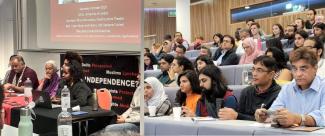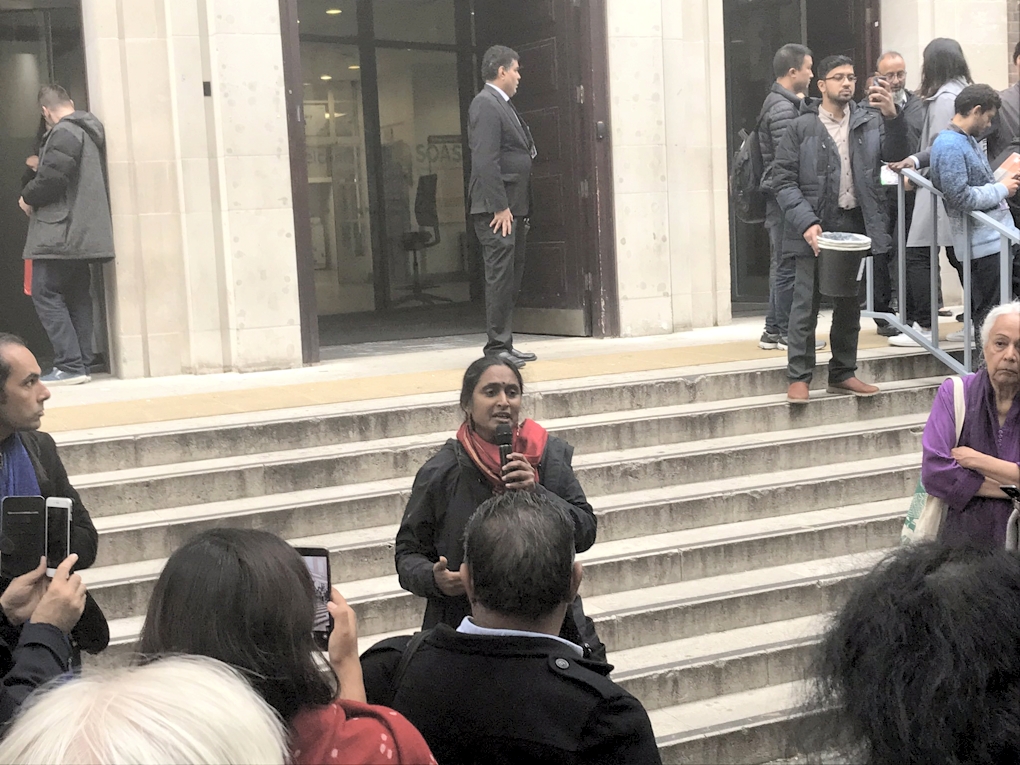
A panel discussion on "Resisting Fascism, Building Solidarities, India Kashmir and Beyond” was held at SOAS, London on 5 October 2019. It was organised by the South Asia Solidarity Group (SASG).
Introducing the event, Kalpana Wilson of SASG spoke about the global rise of far-right, authoritarian, and fascist politics, and said “India’s PM Modi must be counted up there with fascist and far-right leaders like Trump, Bolsonaro, Netanyahu, Erdoğan.”
The first session, chaired by Professor Dibyesh Anand, had CPIML Politburo member Kavita Krishnan, human rights activist Sajjad Hassan, advocate Rajratna Ambedkar, Caste Watch UK activist Satpal Muman and feminist scholar Nitasha Kaul as speakers.
At one point pro-fascist Hindutva supporters tried to disrupt the event, imitating Israeli strategies as ever with a woefully unconvincing attempt at 'pinkwashing': claiming to be the defenders of LGBTQI rights. This was all the more ridiculous given the acute and open homophobia and misogyny of BJP leaders, and the particularly acute impacts of the lockdown in Kashmir (which the disrupters were defending) for sexual minorities. The chair Dibyesh Anand, himself a prominent queer rights activist, was joined by Nitasha Kaul in asking the protestors to stay and engage. Instead, they went out and set off the fire alarm to disrupt the meeting. But the entire meeting reconvened temporarily outside the SOAS building, slogans against Modi and for a free Kashmir were enthusiastically shouted, speeches continued, and then the participants returned inside with increased numbers.

Kavita Krishnan, who had been part of the first teams to visit Kashmir after the lockdown, said that whereas previous Indian regimes wanted silence on Kashmir, the current BJP regime wants to portray Kashmir as a 'rebellious Muslim province' conquered by the Hindu-supremacist Modi. She said that despite all repression, Kashmiris had evolved strategies of resistance and civil disobedience, and were winning the battle of perception globally. She spoke about the Left and progressive movements in India that were mobilising in solidarity with Kashmir and against the NRC.
Nitasha Kaul said, “Kashmir as an unfinished project of the Hindu right goes way back in RSS history. Claim to be bringing LGBT rights is classic colonial homonationalist strategy and indicates the desperation of the global despots.” She stressed that for Indians, “solidarity cannot be based on the idea that Kashmiris are 'our people' but must be because they are people with rights and face a historical issue which has not been resolved.”
Sajjad Hassan spoke about the draconian NRC in Assam and also the openly Islamophobic agenda of NRC and Citizenship Amendment Bill in the rest of India. He said, “All states have been told to build at least one detention centre. This is intended at spreading fear. The ‘foreigner hunt’ ripping communities apart is the BJP's new divisive and polarising strategy after mob lynching.”
Dalit activist and grand nephew of Dr BR Ambedkar, advocate Raj Ratna Ambedkar noted the growing alliance of fascist and far right leaders across the world including Modi. He identified the roots of India’s fascism in caste and communalism.
Satpal Muman explained how campaigners against caste discrimination in the UK have been accused of having a ‘conversion agenda' - a typical trope of Hindutva hate speech. These Hindutva forces in the UK have joined forces with racists to block legislation seeking to recognise and criminalise caste discrimination.
The second session heard speakers from various movements across the world, on ‘Building Global Anti-Fascist Solidarities’. This session was chaired by Amrit Wilson of SASG. Kashmir Solidarity Movement speaker Mariyeh Mushtaq said “BJP are calling on Indian men to enact rape fantasies of Kashmiri women. Their statements reek of orientalist and colonial understandings.”
Musheir Al-Farra, activist from Gaza spoke on the connections and parallels between Palestine and Kashmir. Activists from Madaniya - Sudan Diaspora Global, Zeena Alhassan and Abd Alraheem Omer also spoke on the situation in Sudan. Dr Adam Elliot-Cooper, anti-racist and anti-colonialist researcher and activist from The Monitoring Group also made connections between various global movements.
The panels were followed by a solidarity cultural evening with poetry and music in the SOAS Union room. These included performances by Spoken Word poet Shareefa Energy, singer Najma Akhtar, filmmaker and writer Shagufta Iqbal, singer and poet Shephali Frost, John Pandit of the Asian Dub Foundation, Art Rock musician Kapil Seshasayee. The event was conducted by Ananya Wilson-Bhattacharya and Dj Isuru Perera, leading figure in the Asian Underground pop revival in the UK.
Liberation Archive
- 2001-2010
-
2011-2020
- 2011
- 2012
- 2013
- 2014
- 2015
- 2016
- 2017
- 2018
-
2019
- JANUARY-2019
- FEBRUARY-2019
- MARCH-2019
- APRIL-2019
- May-2019
- LIBERATION, JUNE 2019
- Liberation JULY 2019
- LIBERATION, August 2019
- Liberation, SEPTEMBER 2019
- Liberation, OCTOBER 2019
-
Liberation, NOVEMBER 2019
- Chronic Hunger and Collapsing Banks: India Reels under Modi-Made Disaster
- Assembly Elections Setback For BJP
- NCRB Data and BJP-RSS Contempt For Human Rights
- 2019 Economics Nobel and its Messages
- Savarkar: Bigot Not Patriot
- Savarkar on 1857
- Does 2020 Mark 100 Years of CPI - or 2025?
- Kashmir and NRC: The World Is Watching India
- BJP and RSS Leaders Involved In Jehanabad Communal Riots
- Resisting Fascism, Building Solidarities, India Kashmir and Beyond
- Memorial Meeting at Kanpur for Comrade Hari Singh
- Red Salute to Comrade Jaydev Hembrom
- Red Salute to Comrade Budhua Oraon
- Bhojpur Bandh in Protest of Murder of Comrade Jhari Paswan
- Red Salute to Comrade Biman Biswas
- Fond Homage To Comrade Ram Naresh Ram (Parasji)
- Liberation, DECEMBER 2019
- 2020
- 2021-2030
Charu Bhawan, U-90, Shakarpur, Delhi 110092
Phone: +91-11-42785864 | Fax:+91-11-42785864 | +91 9717274961
E-mail: info@cpiml.org







